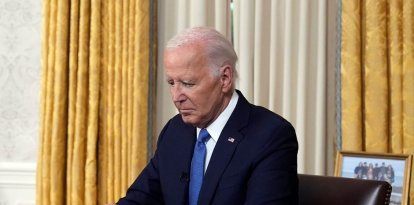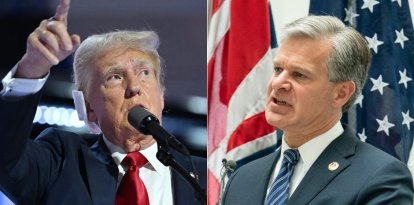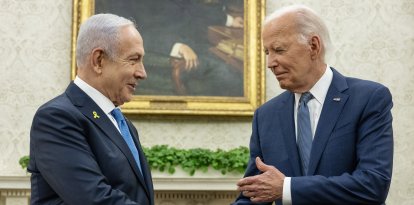Money sent home by immigrants in the United States: A lifeline for the region's dictators
While the economy of totalitarian regimes stabilizes, Joe Biden's administration is focused on softening the foreign policy that former President Donald Trump pushed for the return of democracy in countries such as Cuba, Nicaragua and Venezuela.

(Pexels)
President Joe Biden's open border immigration policy not only affects the United States, it also strengthens dictators in the region. Hundreds of migrants are arriving in the country to work and send financial help to their families in their countries of origin, which has given a break to the economies of countries such as Venezuela, Cuba and Nicaragua.
“But the remittances also provide critical support to fragile states and autocratic regimes which rely on money earned by their citizens abroad to keep their economies afloat. ... Remittances to the developing world hit record $647 billion, aiding the poor but helping keep strongmen from Nicaragua to Tajikistan in power,” according to a piece by The Wall Street Journal.
A report from the International Organization for Migration (IOM), an institution associated with the United Nations (U.N.), revealed that the United States continues to be the leading country in sending remittances abroad. In 2022, the latest data available, workers allocated a total of $79.15 million to their family members or close friends who live in their countries of origin or other territories.
In the case of Venezuela, explains WSJ, a third of households depend on money transferred by migrants to their families. In the last year, one of the biggest challenges faced by the Democratic government in terms of migration is the arrival of hundreds of Venezuelans illegally. Citizens cross several American countries until they reach the United States. More than 7 million Venezuelans have left their country. It is the largest group of refugees in the world, even ahead of the Ukrainians and Syrians who fled wars. The number of Venezuelan migrants in the United States tripled in the last decade.
"The number of Venezuelan immigrants in the United States has nearly tripled since 2010, coinciding with a period of severe economic and political crisis that has resulted in the largest prolonged displacement event in the Americas. The 545,000 Venezuelan immigrants in the United States as of 2021, the most recent year for which U.S. Census Bureau American Community Survey (ACS) data are available, account for just a small share of the more than 7 million who have fled Venezuela since 2015," explained the Migration Policy Institute.
Remittances are also crucial for those left behind
Sending money from abroad to Venezuela, with an economy that has shrunk by 75% in the last decade, helps prevent the humanitarian crisis from deepening. Remittances are crucial for people who have stayed behind, according to Ángel Alvarado, a Venezuelan economist at the University of Pennsylvania. "You can ask, 'How are people not dying of hunger in Venezuela?' The answer is that they have at least one child living abroad, sending money for food and medicine,” Alvarado said in a conversation with WSJ.
Similar is the situation in Nicaragua, where remittances more than doubled between 2018 and 2022 after Danilo Ortega violently attacked protests. This is explained by WSJ, which detailed that remittances are expected to represent at least 33% of that country's GDP. “If you didn’t have remittances, the national economy would collapse. And in macroeconomic terms, Ortega would be in deep trouble,” said Enrique Sáenz, an exiled Nicaraguan economist.
It is no different in the case of Cuba. In fact, the situation on the island shows how the end of remittances can affect societies governed by dictators. Ted Henken, author of books on Cuba and professor at Baruch College in New York, explained that income from abroad can help sustain a failed political system. “Remittances can in some ways grease the wheel of a system that doesn’t work,” says Henken.
The Biden government breathes life to dictators
However, it is not only remittances that have helped dictators stay in power. The United States government announced in May 2022 a series of measures that softened policy towards Cuba. In this way, it represented a reversal of the decisions taken by former President Donald Trump to promote political change on the island. Thus, the limit of $1,000 per quarter on remittances was suspended.
"The Cuban people are confronting an unprecedented humanitarian crisis — and our policy will continue to focus on empowering the Cuban people to help them create a future free from repression and economic suffering," the Biden administration said in a statement.
Additionally, last week, Western Union reactivated its remittance services from the United States to Cuba. In a statement, the financial company announced that in coordination with its counterpart, Orbit SA, it resumed remittances to the island with immediate effect.
Likewise, Joe Biden's government has also promoted a foreign policy that has not contributed to ending these regimes. On the contrary, there has been growing rapprochement between the U.S. and some of those leaders. In fact, Juan González, Biden's special envoy for Latin America, explained last year that the policy of sanctions against officials who violate rights in Venezuela "will not change the status quo" and that, eventually, this policy of sanctions will be ended. pressure.
“Here what we are trying to create are incentives for them to take a different route; but the window is one that will close eventually. And it would be unfortunate because last year, around a million Venezuelans left that country due to the political, economic and security situations,” González said in an interview with Voz de América.
The shift in Biden's policy towards the region's dictatorships has been criticized by different personalities. Renowned Republican Rep. María Elvira Salazar, of Cuban origin, recently assured that the Democratic president must understand that from Cuba, the communist dictatorship promotes the strategy that also keeps Nicaragua and Venezuela stuck under their respective dictatorships.
"The government must not give oxygen to those who repress the people with their boots on the neck. It is very simple, we must help Cubans against the Castro regime and repression that oppresses them. It's not that complicated. Cubans want what everyone in the West wants: freedom, travel, free markets, education. It is a lie that they are Martians looking for something else," Salazar highlighted during a conversation with La Política Online.

























